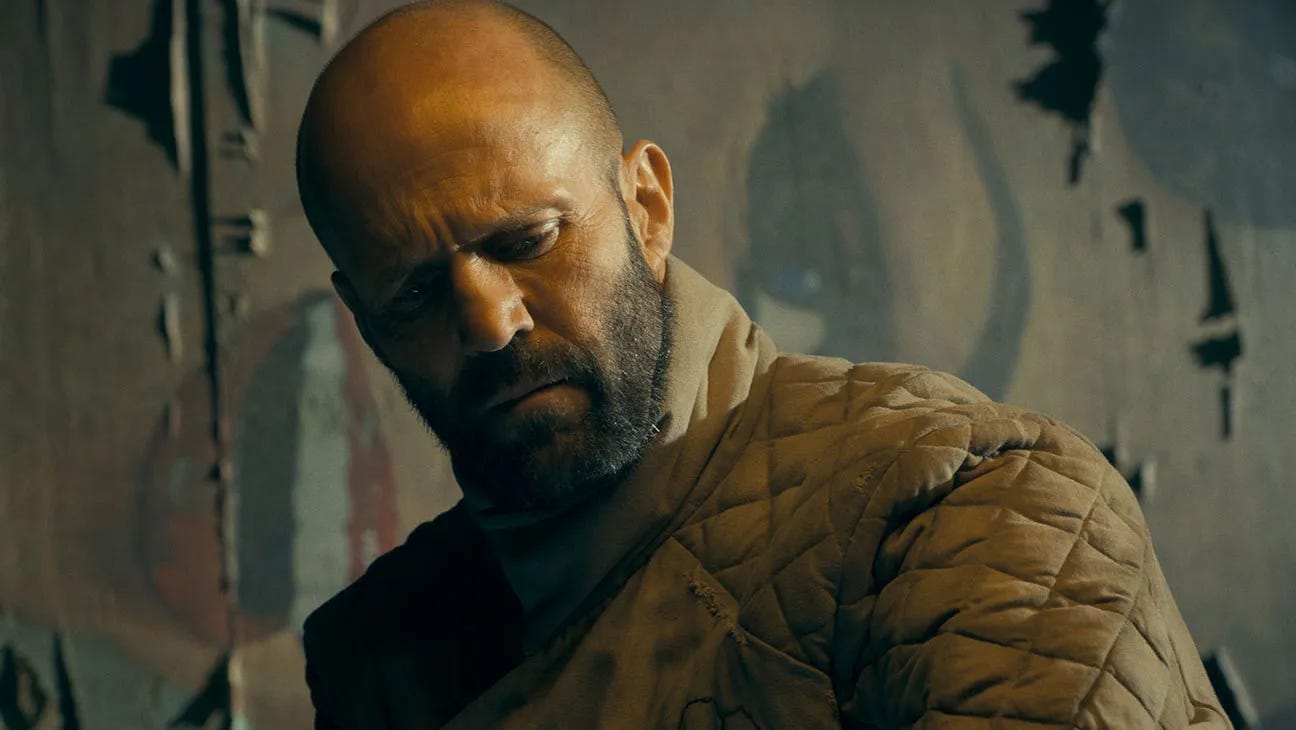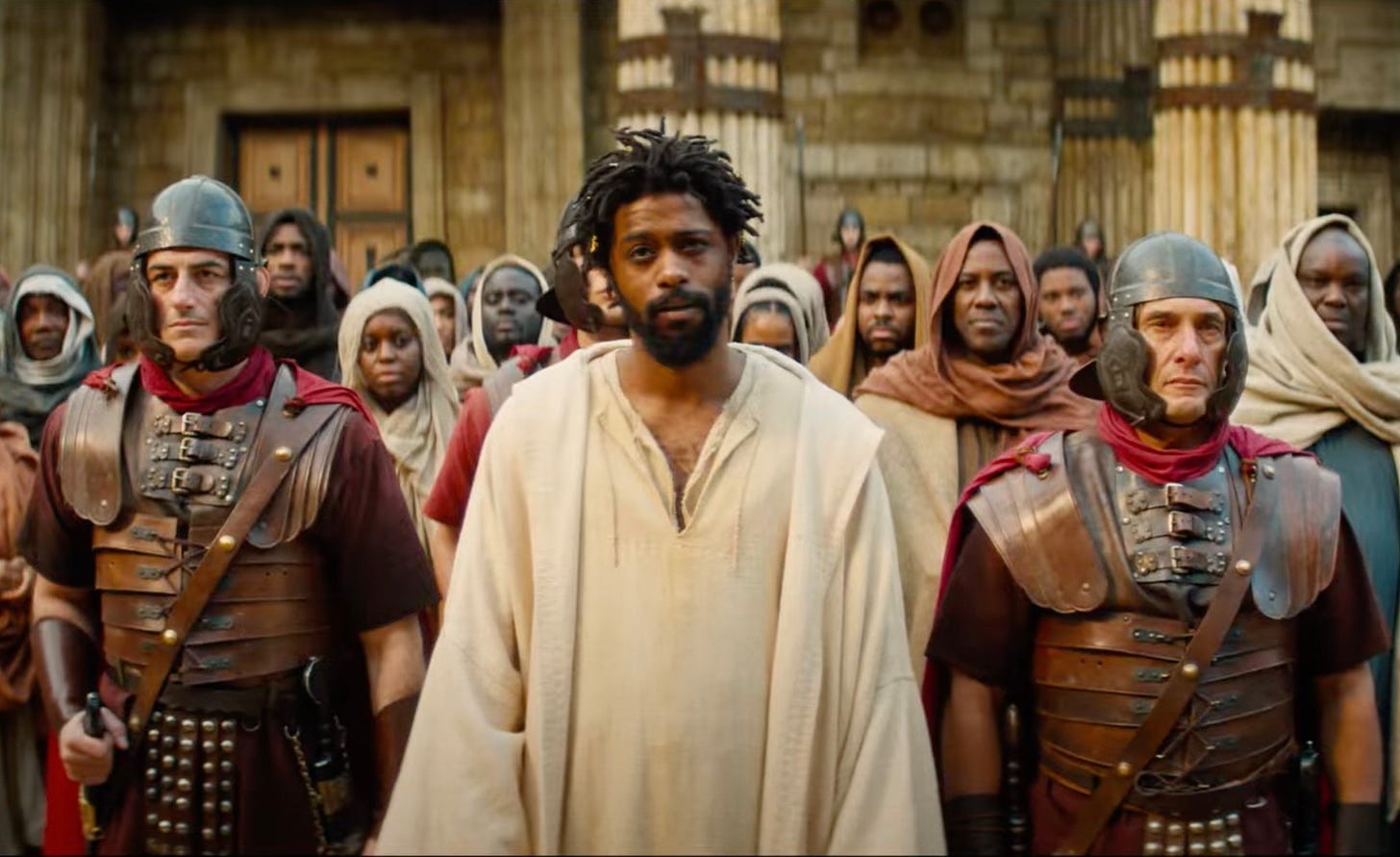In Review: 'The Beekeeper,' 'The Book of Clarence'
Two eccentric studio misfires opening widely on the same weekend? It must be January.
The Beekeeper
Dir. David Ayer
105 min.
Action movies often struggle to find villainous organizations that don’t edge into racism—the Eurotrash plotters of Die Hard and the Taken movies tend to be the safest bet—but The Beekeeper, a January-as-hell Jason Statham vehicle, comes up with the most loathsome modern adversary possible: the phishing scammer. When Statham turns up at a sleek, multistory call center with two five-gallon cans of gasoline and announces bluntly that he’s going to burn the place to the ground, you may find yourself padding your pockets instinctively, looking for a book of matches. Who wouldn’t want to take revenge on the junkmail and pop-up malware artists who bilk grandma out of her nest egg? In a genre flush with shadowy criminal operations, phishing scammers are such a natural that it’s a wonder no one has thought of them before. Perhaps they seemed too untouchable.
Working from a script by action specialist Kurt Wimmer—whose credits include Expend4bles and the remakes of Total Recall and Point Break, suggesting him as a future villain in his own movies—director David Ayer respects Statham’s speak-softly-carry-a-big-fist style, but does plenty of speaking behind the camera. The Beekeeper assumes the form of a Statham programmer, but quickly morphs into a typical sledgehammer-subtle Ayer film, familiar to anyone who’s seen his crime dramas (Harsh Times, End of Watch, Sabotage) or his 2016 take on Suicide Squad. It isn’t enough for him to send Statham barreling through the cartoonishly smug Jordan Belfort types who rally script-readers to seize bank passcodes. He wants to make a larger statement about scam culture that goes high up the food chain.
Say this for The Beekeeper, though: It delivers on its title. In the opening scenes, the taciturn Mr. Clay (Statham) is living modestly in the Massachusetts countryside, where he lives out of a rented barn and quietly tends to his bees. When his host Eloise (Phylicia Rashad), a typically tech-challenged senior, loses her entire savings to a scammer, she takes her own life, leaving Clay and her FBI agent daughter, Verona (Emmy Raver-Lampman), looking for answers. It turns out that Clay is a retired member of a super-duper-secret government agency called “Beekeepers,” which “protects the hive” through unlimited resources and a total lack of accountability. Even a former head of the CIA (Jeremy Irons) shudders at the name.
The phisher-in-chief that Clay seeks is Derek Danforth, a smarmy nepo baby who scoots around the executive floor on a skateboard and keeps a personal sushi chef and an eastern meditation/massage staff on hand to get him through the work day. As played by Josh Hutcherson, he’s another of Wimmer and Ayer’s worthy villains, combining unearned wealth with a comical disregard to others’ misfortune. The larger the conspiracy grows in The Beekeeper, the more the film seems to be nodding toward the corruption of Hunter Biden or the Trump kids without getting too specific about it. It’s fair for Ayer to satirize American capitalism as a systemic scam, but his approach is glib and sloppy, as if casting Statham gives him license to play down to the material.
The shame of The Beekeeper is that Statham’s recent attachments to big-team franchises like The Expendables and The Fast and the Furious have taken him away from the delirium of his ‘00s solo jobs, like The Transporter and Crank movies. For the first third of the film, before Clay’s mission widens, Ayer seems to know precisely what makes a proper Statham vehicle work, making him a deader-than-deadpan presence at the center of outrageous (and wildly stylized) circumstances. Putting him at an office building with a couple of gas cans is an ideal start, but the bigger the targets get, the more Statham seems to shrink in importance. Next time, he might consider bringing gas cans to a movie set. — Scott Tobias
The Beekeeper opens in theaters everywhere today.
The Book of Clarence
Dir. Jeymes Samuel
136 min.
It’s hard to keep your footing watching The Book of Clarence. The second film from musician/artist/filmmaker Jeymes Samuel, who made his directorial debut with the 2021 western The Harder They Fall, has the rhythms of a contemporary comedy, but it’s only sporadically funny. Its interest in spiritual matters is undeniably sincere, though what it wants to say about them isn’t all that clear. The film’s mix of modern dialogue and 21st century trappings redressed for the ancient world plays at times like the Biblical epic equivalent of an acid western, only less trippy than cheeky. It’s a true whatsit of a movie, never quite satisfying but unfailingly intriguing.
Set in Jerusalem shortly before the crucifixion of Jesus (and convincingly shot in the preserved ancient streets and buildings of the Italian city Matera), the film stars LaKeith Stanfield as Clarence, a small-time thief and dealer in a smokable “illegality” called lingonweed. His directionless life stands in stark contrast to his identical twin brother, the Apostle Thomas. As Thomas follows Jesus (Nicholas Pinnock), Clarence hangs around with his sidekick Elijah (RJ Cyler) and pines after Varinia (Anna Diop), the sister of Jedediah (Eric Kofi-Abrefa), a local criminal to whom Clarence is deeply in debt. Then Clarence hits on a brainstorm: If being hailed as a messiah works for Jesus, maybe it could work for him. It might even solve two problems at once, impressing Varinia while getting him out of debt. His journey leads him to meet familiar figures like John the Baptist (David Oleywowo), Mary (Alfre Woodard), and Barabbas (Omar Sy), the lattermost an enslaved gladiator who becomes a devoted follower as Clarence’s mission starts to drift from scamming suckers to doing genuine good.
As its premise suggests, The Book of Clarence’s plot dips into Life of Brian territory a bit, but only a bit. In some respects, it’s an anti-Brian. Clarence makes a journey away from skepticism (and cynicism) toward belief. The last stretch sometimes makes The Book of Clarence feel like a faith-based film that’s been trojan-horsed into a freewheeling comedy. Some of Clarence’s comedic moments are inspired, however, like a hookah bar whose substance makes customers float several feet off the ground or a late-film development involving a well-known British actor. But the film’s best moments are those that use its casting — Jerusalem’s residents are almost entirely Black and their Roman rulers white — to draw connections to the contemporary world, as when Jedediah squares up against the Roman authorities to protect Clarence, who may be a deadbeat but who’s one of his own, or Clarence’s mother (Marianne Jean-Baptiste) cries out, “They always take our babies” as she watches her son march toward punishment at Roman hands. Samuels often seems to be trying to say too much at once in The Book of Clarence, but sometimes what he wants to convey rings loud and clear. —Keith Phipps
The Book of Clarence opens in theaters everywhere today.









Had one fun thought about the Beekeeper plot itself that I will keep to myself to hide even the most modest of spoilers, but wanted to note that the theater for this, while being one of the small sized screens in the Regalverse, was over 70% full for this showing, indicating that a classic Statham-focused big-screen feature was the getaway some of us were looking for this weekend.
As fun as Statham can be, "from the writer of unnecessary remakes and the director of David Ayers movies" just sounds like a headache in movie form. But "January as hell!" is a missed opportunity for a tagline. I enjoyed this trailer whenever it came up in the last month, but every time they said the beekeepers stepped in when things got out of hand I just kept asking, "Then what are they waiting for?!" and knew that alone would take me out of the movie.
Was hoping for better from CLARENCE because I love Stanfield and like HARDER THEY FALL, MacAvoy, (and Cumberbatch) quite a bit.